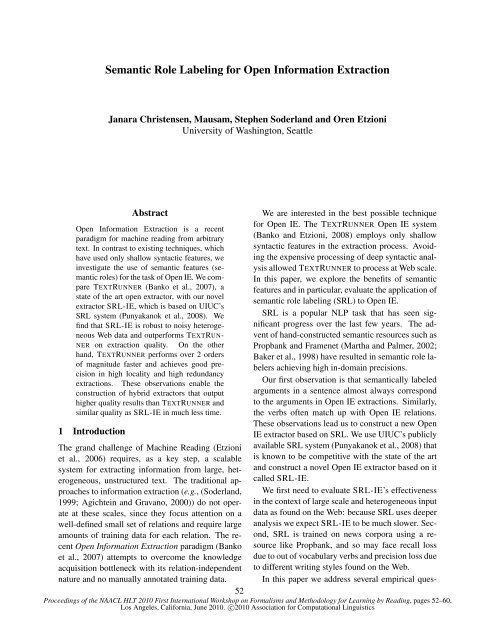W10-09
W10-09
W10-09
You also want an ePaper? Increase the reach of your titles
YUMPU automatically turns print PDFs into web optimized ePapers that Google loves.
Semantic Role Labeling for Open Information Extraction<br />
Janara Christensen, Mausam, Stephen Soderland and Oren Etzioni<br />
University of Washington, Seattle<br />
Abstract<br />
Open Information Extraction is a recent<br />
paradigm for machine reading from arbitrary<br />
text. In contrast to existing techniques, which<br />
have used only shallow syntactic features, we<br />
investigate the use of semantic features (semantic<br />
roles) for the task of Open IE. We compare<br />
TEXTRUNNER (Banko et al., 2007), a<br />
state of the art open extractor, with our novel<br />
extractor SRL-IE, which is based on UIUC’s<br />
SRL system (Punyakanok et al., 2008). We<br />
find that SRL-IE is robust to noisy heterogeneous<br />
Web data and outperforms TEXTRUN-<br />
NER on extraction quality. On the other<br />
hand, TEXTRUNNER performs over 2 orders<br />
of magnitude faster and achieves good precision<br />
in high locality and high redundancy<br />
extractions. These observations enable the<br />
construction of hybrid extractors that output<br />
higher quality results than TEXTRUNNER and<br />
similar quality as SRL-IE in much less time.<br />
1 Introduction<br />
The grand challenge of Machine Reading (Etzioni<br />
et al., 2006) requires, as a key step, a scalable<br />
system for extracting information from large, heterogeneous,<br />
unstructured text. The traditional approaches<br />
to information extraction (e.g., (Soderland,<br />
1999; Agichtein and Gravano, 2000)) do not operate<br />
at these scales, since they focus attention on a<br />
well-defined small set of relations and require large<br />
amounts of training data for each relation. The recent<br />
Open Information Extraction paradigm (Banko<br />
et al., 2007) attempts to overcome the knowledge<br />
acquisition bottleneck with its relation-independent<br />
nature and no manually annotated training data.<br />
We are interested in the best possible technique<br />
for Open IE. The TEXTRUNNER Open IE system<br />
(Banko and Etzioni, 2008) employs only shallow<br />
syntactic features in the extraction process. Avoiding<br />
the expensive processing of deep syntactic analysis<br />
allowed TEXTRUNNER to process at Web scale.<br />
In this paper, we explore the benefits of semantic<br />
features and in particular, evaluate the application of<br />
semantic role labeling (SRL) to Open IE.<br />
SRL is a popular NLP task that has seen significant<br />
progress over the last few years. The advent<br />
of hand-constructed semantic resources such as<br />
Propbank and Framenet (Martha and Palmer, 2002;<br />
Baker et al., 1998) have resulted in semantic role labelers<br />
achieving high in-domain precisions.<br />
Our first observation is that semantically labeled<br />
arguments in a sentence almost always correspond<br />
to the arguments in Open IE extractions. Similarly,<br />
the verbs often match up with Open IE relations.<br />
These observations lead us to construct a new Open<br />
IE extractor based on SRL. We use UIUC’s publicly<br />
available SRL system (Punyakanok et al., 2008) that<br />
is known to be competitive with the state of the art<br />
and construct a novel Open IE extractor based on it<br />
called SRL-IE.<br />
We first need to evaluate SRL-IE’s effectiveness<br />
in the context of large scale and heterogeneous input<br />
data as found on the Web: because SRL uses deeper<br />
analysis we expect SRL-IE to be much slower. Second,<br />
SRL is trained on news corpora using a resource<br />
like Propbank, and so may face recall loss<br />
due to out of vocabulary verbs and precision loss due<br />
to different writing styles found on the Web.<br />
In this paper we address several empirical ques-<br />
52<br />
Proceedings of the NAACL HLT 2010 First International Workshop on Formalisms and Methodology for Learning by Reading, pages 52–60,<br />
Los Angeles, California, June 2010. c○2010 Association for Computational Linguistics


